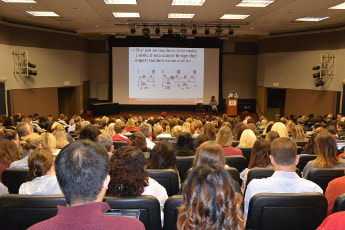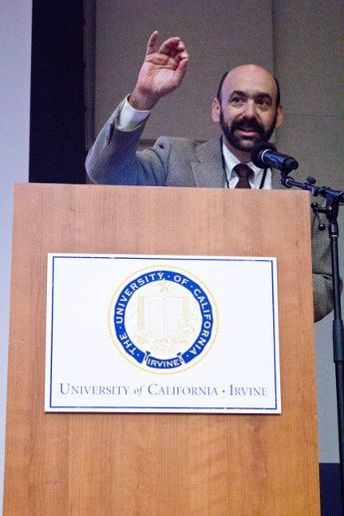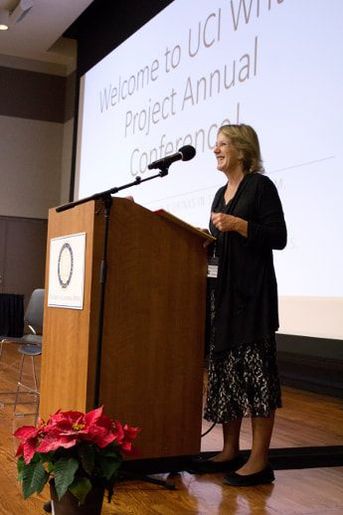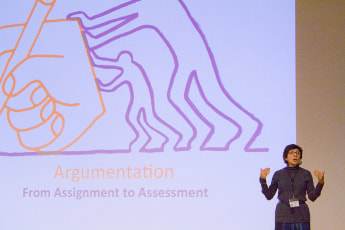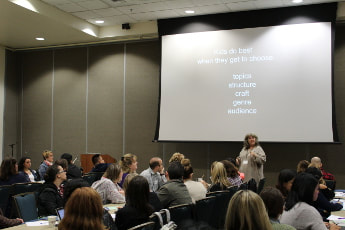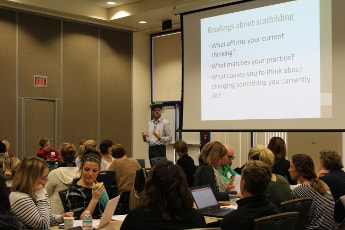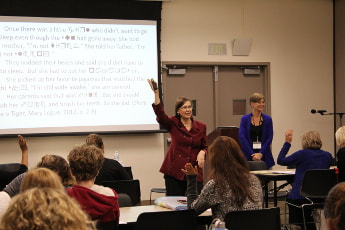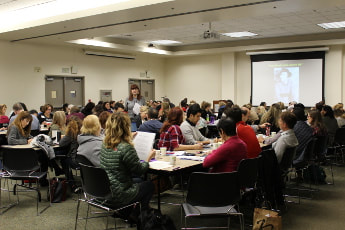Newsletter - January 2017
UCI Writing Project Hosts 22nd Annual Literacy Conference for Teachers
Over 500 educators attended UCI Writing Project's 22nd Annual Literacy Conference for Teachers, held December 13, 2016, at the UCI Student Center. The conference theme was "Teaching Better by Design: Helping Students to Dive Deep as Readers and Writers."
UCI School of Education Dean, Professor Richard Arum, welcomed the educators to UCI. His opening remarks, which included a reference to Bertol Brecht's poem "When Evil Comes Like Falling Rain", centered on the importance of English instruction for preparing students for critical thinking and effective written communication -- essential competencies for not just labor market success, but democratic citizenship.
Following the interactive keynote address delivered by Deborah Appleman (Carlton College) and Jeffrey Wilhelm (Boise State University), participants attended one of five morning workshops (their choice):
The afternoon keynote address was delivered by Jim Burke (Burlingame High School English Teacher): "Writing Better by Design: We are Teachers, NOT Technicians."
Afternoon workshops included the following options:
Additional information about keynote addresses, workshops, and presenters
In addition to the yearly literacy conference in December, the UCI Writing Project offers summer programs for teachers and youth.
Over 500 educators attended UCI Writing Project's 22nd Annual Literacy Conference for Teachers, held December 13, 2016, at the UCI Student Center. The conference theme was "Teaching Better by Design: Helping Students to Dive Deep as Readers and Writers."
UCI School of Education Dean, Professor Richard Arum, welcomed the educators to UCI. His opening remarks, which included a reference to Bertol Brecht's poem "When Evil Comes Like Falling Rain", centered on the importance of English instruction for preparing students for critical thinking and effective written communication -- essential competencies for not just labor market success, but democratic citizenship.
Following the interactive keynote address delivered by Deborah Appleman (Carlton College) and Jeffrey Wilhelm (Boise State University), participants attended one of five morning workshops (their choice):
- Who's Doing the Work? How to Say Less so Readers Can Do More (Grades K-8)
- Scaffolding Instruction for All Learners in the Writing Workshop (Grades K-8)
- From Nursey Rhymes to Shakespeare: Borrowing Text Structures to Navigate Reading and Empower Writing (Grades K-12)
- Teaching Argument Writing (Grades 4-12)
- Getting Practical: Using Readers Rulers of Notice to Navigate Fiction (Grades 4-12)
- Learning to Love Nonfiction: Lessons from a Literature Teacher's Playbook (Grades 6-12)
The afternoon keynote address was delivered by Jim Burke (Burlingame High School English Teacher): "Writing Better by Design: We are Teachers, NOT Technicians."
Afternoon workshops included the following options:
- They Grew Up Reading and Writing: Giving Students Authentic Reasons to Read Informational Text Closely (Grades 1-8)
- Grammar Keepers: How to Use a Daily Journal Routine to Teach Grammar Thoroughly (Grades 3-12)
- The Power of Peers: Organizing and Managing Peer Conferences in Writing Workshop (Grades 4-12)
- The Role of Poetry in Our Curriculum and in Students' Lives (Grades 4-12)
- Getting Practical: Using Readers Rules of Notice to Navigate Nonfiction (Grades 4-12)
- Teaching Better by Design: How Technology Made Me a Better Teacher (Grades 6-12)
Additional information about keynote addresses, workshops, and presenters
In addition to the yearly literacy conference in December, the UCI Writing Project offers summer programs for teachers and youth.
- Summer Institute for Teachers: 2017 Application
- Summer Workshops for Teachers
- UCI Summer Youth Program, now in its 34th year, for grades Kindergarten through high school
- SAT Preparation, for high school students
UCOP Grant to Support UC Consortium on the Developmental Science of Adolescence
The UC Multicampus Research Programs and Initiatives competition has awarded funding for a UC Consortium on the Developmental Science of Adolescence.
PI/Host Campus: Andrew J. Fuligni, PhD, Professor of Psychiatry & Psychology, Semel Institute for Neuroscience and Human Behavior, UCLA
Co-PIs/Campuses
Participating faculty, with expertise in neuroscience and biobehavioral processes, social context, typical and atypical development, and population diversity, include the following:
Initiation: 2017
Rationale: Multiple biological and social changes make adolescence a key period of developmental transition. Biologically, pubertal processes and brain maturation create heightened emotional lability and reward sensitivity, with a more gradual maturation in cognitive control. Interpersonally, children increasingly replace family time with friend time, pay greater attention to the opinions of their peers, and begin romantic relationships. Structurally, the developmental period spans educational transitions to middle and high school, and for some, to college and the work force. The manner in which these transitions are negotiated – by adolescents, their families, and society – has significant implications for lifelong trajectories of health and well-being. Overshadowed by the national emphasis on early childhood over the past couple of decades, adolescence has re-emerged as a critical developmental period worthy of scientific and public health attention. Historical epidemiological research indicates that experiences during adolescence have perhaps the greatest consequence for adult health and longevity.
Topics to be pursued:
Goals: The primary goal is to be an incubator of collaborative research across campuses, providing the support and settings necessary for the development of ideas and efforts to obtain extramural support for research, training, and outreach. Consortium members will be pursuing the following three specific aims:
The UC Multicampus Research Programs and Initiatives competition has awarded funding for a UC Consortium on the Developmental Science of Adolescence.
PI/Host Campus: Andrew J. Fuligni, PhD, Professor of Psychiatry & Psychology, Semel Institute for Neuroscience and Human Behavior, UCLA
Co-PIs/Campuses
- Ronald Dahl, UC Berkeley
- Amanda Guyer, UC Davis,
- Jacquelynne Eccles, UC Irvine
- Phillip Hammack, UC Santa Cruz
Participating faculty, with expertise in neuroscience and biobehavioral processes, social context, typical and atypical development, and population diversity, include the following:
- UCLA: Mirella Dapretto, Adriana Galván, Sandra Graham, Jaana Juvonen, Jennifer Silvers
- UC Berkeley: Julienne Deardorff, Emily Ozer, Jennifer Skeem, Ahna Suleiman, Linda Wilbrech
- UC Davis: Katherine Conger, Paul Hastings, Camelia Hostinar, Adrienne Nishina, Richard Robins
- UC Irvine: Elizabeth Cauffman, Jodi Quas, Sandra Simpkins
- UC Santa Cruz: Margarita Azmitia, Christy Byrd, Catherine Cooper, Campbell Leaper
Initiation: 2017
Rationale: Multiple biological and social changes make adolescence a key period of developmental transition. Biologically, pubertal processes and brain maturation create heightened emotional lability and reward sensitivity, with a more gradual maturation in cognitive control. Interpersonally, children increasingly replace family time with friend time, pay greater attention to the opinions of their peers, and begin romantic relationships. Structurally, the developmental period spans educational transitions to middle and high school, and for some, to college and the work force. The manner in which these transitions are negotiated – by adolescents, their families, and society – has significant implications for lifelong trajectories of health and well-being. Overshadowed by the national emphasis on early childhood over the past couple of decades, adolescence has re-emerged as a critical developmental period worthy of scientific and public health attention. Historical epidemiological research indicates that experiences during adolescence have perhaps the greatest consequence for adult health and longevity.
Topics to be pursued:
- Learning and Motivation
- Social Integration and Contribution
- Psychological, Physical and Sexual Health
- Population Diversity and Intergroup Relations
- Juvenile Justice
Goals: The primary goal is to be an incubator of collaborative research across campuses, providing the support and settings necessary for the development of ideas and efforts to obtain extramural support for research, training, and outreach. Consortium members will be pursuing the following three specific aims:
- Generate integrative research on the developmental science of adolescence at the University of California
- Provide graduate training opportunities in the developmental science of adolescence
- Promote public understanding of the developmental science of adolescence
UCOP Grant Funds New UC Multicampus Center: Science-Based Innovation in Learning (SIL)
The University of California Office of the President (UCOP) Multicampus Research Programs and Initiative (MRPI) has funded the proposal to develop the California Science-Based Innovation in Learning (SIL) Center.
PI/Host Campus: Fumiko Hoeft, UCSF, Neuro/Medical, Learning Disabilities
Co-PIs/Campuses:
Additional Investigators:
Duration of Grant: 2017-2019
Rationale
In the US, 9.2% of public school children are English language learners (ELLs), and ELL enrollment has grown 50% over the past decade, outpacing non-ELL enrollment. In California (CA), a quarter of the school-aged children in the public schools are ELLs. ELLs are twice as likely as non-ELLs to live in poverty and more likely to be misidentified than non-ELLs for learning disabilities (LDs) such as reading disorders (RD). Learning disabilities and their misidentification in ELLs further contributes to ELL inequality in English proficiency and educational attainment, leading to income and health disparity.
Reducing education-related risks for poor health outcomes in ELLs requires efforts to better understand the link between educational attainment and health disparity in this population, and early identification of LD in ELLs. Although there are good predictors of RD in English monolinguals, extending these to ELLs is complicated by variability in language experience, lack of English proficiency, variability in the native languages spoken by ELLs, and the lack of normed measures (except Spanish) and qualified practitioners. One third of all US ELLs are in CA, making these issues particularly significant for the state and UC, while at the same time providing the opportunity for UC to be a leader in addressing these issues.
Center Goals
The short-term goals of the Center are to: (1) setup an innovative, multicampus, cross-disciplinary collaboration bridging education, cognitive sciences, medicine, and policy, and (2) perform a series of pilot studies to examine the links between academic and health outcomes in ELLs and evaluate individualized prescription of reading interventions that will prepare Center investigatorsto compete for federal center and collaborative research grants in the near future.
The long-term goal is for the UC center to be a national leader in "Precision Ed-Health", and tackle issues associated with education and health disparity in underrepresented populations, with an initial emphasis on early identification and intervention of children at risk for learning challenges. The central mission includes performing high quality research and providing training, services, and advocacy. Such efforts will ultimately enhance the lives of children and families, while addressing major issues in CA and the US, including the cost of education, difficulties of educating diverse populations including ELLs, and the health consequences of poor school performance.
The University of California Office of the President (UCOP) Multicampus Research Programs and Initiative (MRPI) has funded the proposal to develop the California Science-Based Innovation in Learning (SIL) Center.
PI/Host Campus: Fumiko Hoeft, UCSF, Neuro/Medical, Learning Disabilities
Co-PIs/Campuses:
- Silvia Bunge, UC Berkeley, Cognitive Neurology
- Jamal Abedi, UC Davis, English Learner
- Carol Connor, UC Irvine, Instruction
- Marcelo Suarez-Orozco, UCLA, Education Policy, together with Susanna Loeb, Stanford University
- Jeff Gilger, UC Merced, Training & Education
Additional Investigators:
- Roeland Hancock, Computation and Biostatistics
- Elissa Epel /Nicki Bush, Health Disparity
- Nancy Cushen White, Intervention /RD
- MariLu Gorno Tempini, Language Processes
- Bob Hendren, UCSF Dyslexia Center
- Linda Siegel, University of British Columbia
Duration of Grant: 2017-2019
Rationale
In the US, 9.2% of public school children are English language learners (ELLs), and ELL enrollment has grown 50% over the past decade, outpacing non-ELL enrollment. In California (CA), a quarter of the school-aged children in the public schools are ELLs. ELLs are twice as likely as non-ELLs to live in poverty and more likely to be misidentified than non-ELLs for learning disabilities (LDs) such as reading disorders (RD). Learning disabilities and their misidentification in ELLs further contributes to ELL inequality in English proficiency and educational attainment, leading to income and health disparity.
Reducing education-related risks for poor health outcomes in ELLs requires efforts to better understand the link between educational attainment and health disparity in this population, and early identification of LD in ELLs. Although there are good predictors of RD in English monolinguals, extending these to ELLs is complicated by variability in language experience, lack of English proficiency, variability in the native languages spoken by ELLs, and the lack of normed measures (except Spanish) and qualified practitioners. One third of all US ELLs are in CA, making these issues particularly significant for the state and UC, while at the same time providing the opportunity for UC to be a leader in addressing these issues.
Center Goals
The short-term goals of the Center are to: (1) setup an innovative, multicampus, cross-disciplinary collaboration bridging education, cognitive sciences, medicine, and policy, and (2) perform a series of pilot studies to examine the links between academic and health outcomes in ELLs and evaluate individualized prescription of reading interventions that will prepare Center investigatorsto compete for federal center and collaborative research grants in the near future.
The long-term goal is for the UC center to be a national leader in "Precision Ed-Health", and tackle issues associated with education and health disparity in underrepresented populations, with an initial emphasis on early identification and intervention of children at risk for learning challenges. The central mission includes performing high quality research and providing training, services, and advocacy. Such efforts will ultimately enhance the lives of children and families, while addressing major issues in CA and the US, including the cost of education, difficulties of educating diverse populations including ELLs, and the health consequences of poor school performance.
California Teacher Education Research & Improvement Network Receives UCOP President’s Research Catalyst Award
UC President Janet Napolitano announced the recipients of the 2017 President’s Research Catalyst Awards. The award is a presidential initiative intended to support and highlight exemplary research in strategic areas that benefit UC, California and the nation.
The proposal for the California Teacher Education Research & Improvement Network was one of three proposals selected from a pool of more than 100 proposed projects. University of California Press Release: https://www.universityofcalifornia.edu/press-room/uc-president-announces-2017-research-catalyst-awards
Title: California Teacher Education Research & Improvement Network (CTERIN)
Funder: University of California Office of the President: President’s Research Catalyst Awards
Amount: $1,500,000
Implementation: 2017
PI: Tine Sloan, UC Santa Barbara
Co-PIs
Co-Investigators
Rationale
The need for well-prepared California teachers has never been greater. The state faces serious issues: teacher shortages in key areas such as math, science, and special education; persistent achievement gaps; calls for greater inclusion of students with special needs; the implementation of new English, math, and science standards; and new standardized assessments. In order to improve the quality of California’s K-12 teachers while increasing quantity, nine UC campuses will develop the California Teacher Education Research and Improvement Network (CTERIN). This network will respond to pressing needs for research on policy and practice linked to teacher education in California by
UC President Janet Napolitano announced the recipients of the 2017 President’s Research Catalyst Awards. The award is a presidential initiative intended to support and highlight exemplary research in strategic areas that benefit UC, California and the nation.
The proposal for the California Teacher Education Research & Improvement Network was one of three proposals selected from a pool of more than 100 proposed projects. University of California Press Release: https://www.universityofcalifornia.edu/press-room/uc-president-announces-2017-research-catalyst-awards
Title: California Teacher Education Research & Improvement Network (CTERIN)
Funder: University of California Office of the President: President’s Research Catalyst Awards
Amount: $1,500,000
Implementation: 2017
PI: Tine Sloan, UC Santa Barbara
Co-PIs
- UC Berkeley: George Johnson
- UC Davis: Rebecca Ambrose
- UC Irvine: Elizabeth van Es
- UC Los Angeles: Jody Priselac
- UC Merced: Maya Tokman
- UC Riverside: Thomas Smith
- UC San Diego: Alan Daly
- UC Santa Cruz: Lora Bartlett
Co-Investigators
- UC Berkeley: Prudence Carter, Jessica Charles, Jabari Mahiri, Alan Schoenfeld, David Pearson, Elisa Stone
- UC Davis: Sandy Carlson, Mary-Betty Stevenson, Susann Pinter, Beth Broome
- UC Irvine: Richard Arum, George Farkas, Hosun Kang, Virginia Panish
- UC Los Angeles: Marcelo M. Suarez-Orozco, Megan Franke, Annamarie Frencois, Arlene Russell, Lorena Guillen
- UC Merced: Irenee R. Beattie, Chelsea Arnold
- UC Riverside: Cassandra Guarino, Rita Kohli, Rollanda O’Connor, Robert Ream, Leslie Bushong, Pamela Clute
- UC San Diego: Cheryl Forbes, Jeff Remmel, Sherice Clarke, Megan Hopkins
- UC Santa Barbara: Jeffrey Milem, Jason Duque, Sarah Roberts, Julie Bianchini, Andrew Fedders, Tim Dewar, Amber Moran, Diana Arya, George Singer
- UC Santa Cruz: Trish Stoddard, Gretchen Andreason, Kip Tellez, Dorish Ash, Judit Moschkovich, Cindy Cruz, Ronald Glass, June Gordon, Eduardo Mosqueda, Juditih Scott, Brad Olsen
Rationale
The need for well-prepared California teachers has never been greater. The state faces serious issues: teacher shortages in key areas such as math, science, and special education; persistent achievement gaps; calls for greater inclusion of students with special needs; the implementation of new English, math, and science standards; and new standardized assessments. In order to improve the quality of California’s K-12 teachers while increasing quantity, nine UC campuses will develop the California Teacher Education Research and Improvement Network (CTERIN). This network will respond to pressing needs for research on policy and practice linked to teacher education in California by
- Developing a research infrastructure and statewide data system
- Conducting research on policy implementation in service to the state
- Researching the efficacy of teacher preparation (e.g., 5th year post-bac, undergraduate, and intern pathways)
- Developing cross-campus doctoral programs in teacher education scholarship and practice
New IES Publication: "Teaching Secondary Students to Write Effectively"
The U.S. Department of Education Institute of Education Sciences (IES) has released the 2017 publication Teaching Secondary Students to Write Effectively. The publication is intended to provide educators with the best available evidence and expertise for teaching students in grades 6-12 to write effectively.
Starting with an extensive literature review of 3200 citations, 1995 through 2005, which were identified as literature related to secondary writing instruction, research staff added 300 additional studies not included in the original search, then used the What Works Clearinghouse design standards to screen the 3,500 studies for relevance according to specific eligibility criteria. Excluded were studies that did not include populations of interest, measure relevant outcomes, or assessment of replicable practices for teaching secondary writing.
From a narrowed selection of 55 studies, 15 were judged to meet the WWC's design standards. Professor Carol Booth Olson's Pathway Project study was one of the 15. Professor Olson also was one of the six expert panel members selected to guide development of the publication.
Teaching Secondary Students to Write Effectively is available online for download from IES: http://ies.ed.gov/ncee/wwc/PracticeGuide/22
The U.S. Department of Education Institute of Education Sciences (IES) has released the 2017 publication Teaching Secondary Students to Write Effectively. The publication is intended to provide educators with the best available evidence and expertise for teaching students in grades 6-12 to write effectively.
Starting with an extensive literature review of 3200 citations, 1995 through 2005, which were identified as literature related to secondary writing instruction, research staff added 300 additional studies not included in the original search, then used the What Works Clearinghouse design standards to screen the 3,500 studies for relevance according to specific eligibility criteria. Excluded were studies that did not include populations of interest, measure relevant outcomes, or assessment of replicable practices for teaching secondary writing.
From a narrowed selection of 55 studies, 15 were judged to meet the WWC's design standards. Professor Carol Booth Olson's Pathway Project study was one of the 15. Professor Olson also was one of the six expert panel members selected to guide development of the publication.
Teaching Secondary Students to Write Effectively is available online for download from IES: http://ies.ed.gov/ncee/wwc/PracticeGuide/22
"Assistance or Obstacle? The Impact of Different Levels of English Developmental Education on Underprepared Students in Community Colleges"
Xu, D. (2016). Assistance or obstacle? The impact of different levels of English developmental education on underprepared students in community colleges. Educational Researcher.
DOI:10.3102/0013189X16683401
Abstract
Developmental education is the most common approach used by community colleges to assist underprepared students for college-level course work. Yet there is limited evidence regarding this strategy on students assigned to the lowest level of the developmental sequence. This paper extends current knowledge on this critical question by examining the impacts of different levels of developmental reading and writing on students’ academic outcomes. The results suggest that the impacts are generally insignificant for students on the margin of needing developmental course work, yet the estimates are negative on students assigned to the lowest level of the developmental sequence. The results therefore support the increasing national push to reform these programs.
Xu, D. (2016). Assistance or obstacle? The impact of different levels of English developmental education on underprepared students in community colleges. Educational Researcher.
DOI:10.3102/0013189X16683401
Abstract
Developmental education is the most common approach used by community colleges to assist underprepared students for college-level course work. Yet there is limited evidence regarding this strategy on students assigned to the lowest level of the developmental sequence. This paper extends current knowledge on this critical question by examining the impacts of different levels of developmental reading and writing on students’ academic outcomes. The results suggest that the impacts are generally insignificant for students on the margin of needing developmental course work, yet the estimates are negative on students assigned to the lowest level of the developmental sequence. The results therefore support the increasing national push to reform these programs.
Faculty Articles in Refereed Journals: January through December 2016
- Bailey, D.H., & Littlefield, A.K. (2016). Does reading cause later intelligence? Accounting for stability in models of change. Child Development. DOI:10.1111/cdev.12669
- Bailey, D., Duncan, G.J., Odgers, C.L., & Yu, W. (2016). Persistence and fadeout in the impacts of child and adolescent interventions. Journal of Research on Educational Effectiveness. DOI:10.1080/19345747.2016.1232459
- Bailey, D., Nguyen, T., Jenkins, J.M., Domina, T., Clements, D.H., & Sarama, J.S. (2016). Fadeout in an early mathematics intervention: Constraining content or preexisting differences? Developmental Psychology, 52(9). DOI:10.1037/dev0000188
- Watts, T., Clements, D.H., Sarama, J., & Bailey, D. (2016). Does early mathematics intervention change the processes underlying children's learning? Journal of Research on Educational Effectiveness. DOI:10.1080/19345747.2016.1204640
- Schenke, K., Lam, A.C., Rutherford, T., & Bailey, D.H. (2016). Construct confounding among predictors of mathematics achievement. AERA Open,2. DOI:10.1177/2332858416648930.
- Stoet, G., Bailey, D.H., Moore, A.M., & Geary, D.C. (2016). Countries with higher levels of gender equality show larger national sex differences in mathematics anxiety and relatively lower parental mathematics valuation for girls. PLoS ONE 11(4). DOI:10.1371/journal.pone.0153857
- Puts, D.A., Hill, A.K., Bailey, D.H., Walker, R.S., Rendall, D., Wheatley, J.R., Welling, L.L.M., Dawood, K., Cárdena, R., Burriss, R.P., Jablonski, N.G., Shriver, M.D., Weiss, D., Lameira, A.R., Apicella, C.L., Owren, M.J., Barelli, C., Glenn, M. E., & Ramos–Fernandez, G. (2016). Sexual selection on male vocal fundamental frequency in humans and other anthropoid primates. Proceedings of the Royal Society of London B: Biological Sciences, 283. DOI:rpsb.20152830.
- Baker, R. (2016). The effects of structured transfer pathways in community colleges. Educational Evaluation and Policy Analysis. DOI: 10.3102/0162373716651491
- Baker, R.B., Evans, B., & Dee, T. (2016). A randomized experiment testing the efficacy of a scheduling nudge in a massive open online course (MOOC). AERA Open, 2(4). DOI:10.1177/2332858416674007
- Evans, B.J., Baker, R.B., & Dee, T. (April 2016). Persistence patterns in Massive Open Online Courses (MOOCs). The Journal of Higher Education, 87(2), 206-242.
- Reardon, S.F., Kasman, M., Klasik, D.J., & Baker, R.B. (2016). Student resources and stratification among colleges: An agent-based simulation of five mechanisms of the college sorting process. Journal of Artificial Societies and Social Simulation, 19(1), 8. DOI:10.18564/jasss.2993
- Schuck, S., Emmerson, N., Ziv, H., Collins, P., Arastoo, S., Warschauer, M., Crinella, F., & Lakes, K. (2016). Designing an iPad App to monitor and improve classroom behavior for children with ADHD: iSelfControl feasibility and pilot studies. PLoS One 11(10): e0164229. DOI:10.1371/journal.pone.0164229.
- Connor, C.M. (2016). A lattice model of reading comprehension. Child Development Perspectives, 10(4), 269-274. DOI:10.1111/cdep.12200
- Day, S., & Connor, C.M. (2016). Examining the relations between self-regulation and achievement in third-grade students. Assessment for Effective Intervention. DOI:10.1177/1534508416670367
- Sparapani, N., Connor, C.M., Day, S., Wood, T., Ingebrand, S.W., McLeigh, L., & Phillips, B.M. (2016). Profiles of foundational learning skills among first graders. Learning and Individual Differences. DOI:10.1016/j.lindif.2016.07.008
- Connor, C.M., Day, S.L., Phillips, B., Sparapani, N., Ingebrand, S.W., McLean, L., Barrus, A., & Kaschak, M.P. (2016). Reciprocal effects of self-regulation, semantic knowledge, and reading comprehension in early elementary school. Child Development. DOI:10.1111/cdev.12570
- McLean, L., Sparapani, N., Toste, J.R., & Connor, C.M. (2016). Classroom quality as a predictor of first graders' time in non-instructional activities and literacy achievement. Journal of School Psychology, 56, 45-58. DOI:10.1016/j.jsp.2016.03.004
- Connor, C.M., & Morrison, F.J. (2016). Individualizing student instruction in reading implications for policy and practice. Policy Insights from the Behavioral and Brain Sciences, 3(1), 54-61. DOI:10.1177/2372732215624931
- Terry, N.P., Connor, C.M., Johnson, L., Stuckey, A., & Tani, N. (2016). Dialect variation, dialect-shifting, and reading comprehension in second grade. Reading and Writing, 29(2), 267-295. DOI:10.1007/s11145-015-9593-9
- Al Otaiba, S., Folsom, J.S., Wanzek, J., Greulich, L., Waesche, J., Schatschneider, C., & Connor, C.M. (2016). Professional development to differentiate Kindergarten tier 1 instruction: Can already effective teachers improve student outcomes by differentiating Tier 1 instruction?. Reading & Writing Quarterly, 32(5), 454-476. DOI:10.1080/10573569.2015.1021060
- Connor, C M., Petscher, Y.M., Otaiba, A., & Dent, S. (2016). Psychometric analysis of the diagnostic evaluation of language variation assessment. Assessment for Effective Intervention, 37(4), 244-251. DOI: 10.1177/1534508411413760
- Duncan, G.J., Magnuson, K., Votruba-Drzal, E. (in press). Moving beyond correlations in assessing the consequences of poverty. Annual Review of Psychology, 68(1). DOI:10.1146/annurev-psych-010416-044224
- Nguyen, T., Watts, T., Duncan, G., Clements, D.H., Sarama, J.S., Wolfe, C., & Spitler, M.E. (2016). Which preschool mathematics competencies are most predictive of fifth grade achievement? Early Childhood Research Quarterly, 36. DOI:10.1016/j.ecresq.2016.02.003
- Magnuson, K.A., Kelchen, R., Duncan, G., Schindler, H.S., Shager, H., & Yoshikawa, H. (2016). Do the effects of early childhood education programs differ by gender? A meta-analysis. Early Childhood Research Quarterly, 36. DOI:10.1016/j.ecresq.2015.12.021
- Grindal, R., Bowne, J.B., Yoshikawa, H., Schindler, H.S., Duncan, G., Magnuson, K., & Shonkoff, J.P. (2016). The added impact of parenting education in early childhood education programs: A meta-analysis. Children and Youth Services Review, 70. DOI:10.1016/j.childyouth.2016.09.018
- Duncan, G., Magnuson, K., Kalil, A., & Ziol-Guest, K. (2016). The importance of early childhood poverty. Social Indicators Research, 108(1), 1-12.
- Riley, A.W., & Duncan, G.J. (2016). Completing a national birth cohort in the United States. JAMA Pediatrics, 170(9), 829-830. DOI:10.1001/jamapediatrics.2016.1760
- Kessler, R.C., Duncan, G., Gennetian, L.A., Katz, L.F., Kling, J.R., Sampson, N.A., Sanvonmatsu, L., Zaslavsky, A.M., & Ludwig, J. 2016). Notice of retraction and replacement: Associations of housing mobility interventions for children in high-poverty neighborhoods with subsequent mental disorders during adolescence. JAMA. 2014; 311(9), 937-947. DOI:10.1001/jama.2016.6187
- Kessler, R.C., Duncan, G., Gennetian, L.A., Katz, L.F., Kling, J.R., Sampson, N.A., Sanvonmatsu, L., Zaslavsky, A.M., & Ludwig, J. 2016). Notice of retraction and replacement: Associations of housing mobility interventions for children in high-poverty neighborhoods with subsequent mental disorders during adolescence. JAMA. 2014; 311(9), 937-947. DOI:10.1001/jama.2016.6187
- Magnuson, K., Duncan, G., Lee, K.T.H., & Metzger, M.W. (2016). Early school adjustment and educational attainment. American Educational Research Journal 53(4), 1-31. DOI:10.3102/0002831216634658
- Duncan, G., Magnuson, K., & Murnane, R.J. (2016). Reforming preschools and schools. Academic Pediatrics 16(3):S121-S127. DOI:10.1016/j.acap.2015.12.003
- Garfield, C., Duncan, G., Peters, S., & Chase-Lansdale, P.L. (2016). Adolescent reproductive knowledge, attitudes, and beliefs and future fatherhood. Journal of Adolescent Health. DOI:10.1016/j.jadohealth.2015.12.010
- Au, J., Buschkuehl, M., Duncan, G.J., & Jaeggi, S.M. (2016.). There is no convincing evidence that working memory training is NOT effective: A reply to Melby-Lervåg and Hulme. Psychonomic Bulletin & Review, 23(1), 331-337. DOI:10.3758/s13423-015-0967-4
- Moeller, J., Dietrich, J., Eccles, J.S., & Schneider, B. (in press). Passionate experiences in adolescence: Situational variability and long-term stability. Journal of Research on Adolescence.
- Jones, J.D., Ehrlich, K.G., Brett, B.E., Gross, J.T., Mohr, J.J., Hopper, E.A., Dinh, J.V., Malanchuk, O., Peck, S.C., Brodish, A.B., Adam, E.K., Eccles, J.S., Kemeny, M.E., & Cassidy, J. (2016). Perceptions of parental secure base support in African American adolescents and young adults. Journal of Social and Personal Relationships.DOI:10.1177/0265407516670532
- D’hondt, F., Eccles, J.S., Van Houtte, M., & Stevens, P.D.J. (2016). The relationships of teacher ethnic discrimination, ethnic identification, and host national identification to school misconduct of Turkish and Moroccan immigrant adolescents in Belgium. Deviant Behavior. DOI:10.1080/01639625.2016.1197004
- Eccles, J.S. (2016). Engagement: Where to next? Learning and Instruction, 43, 71-75. DOI:10.1016/j.learninstruc.2016.02.003
- Eccles, J.S., & Wang, M-T. (2016). What motivates females and males to pursue careers in mathematics and science? International Journal of Behavioral Development, 40(2), 100-106.
- D’hondt, F., Eccles, J.S., Van Houtte, M., & Stevens, P.D.J. (2016). Perceived ethnic discrimination by teachers and ethnic minority students' academic futility: Can parents prepare their youth for better or for worse? Journal of Youth and Adolescence. DOI:10.1007/s10964-016-0428-z
- Jiang, S., Schenke, K., Eccles, J.S., Xu, D., & Warschauer, M. (2016). Females' enrollment and completion in science, technology, engineering, and mathematics Massive Open Online Courses. Computers and Society.
- He, W., Holton, A., Farkas, G., & Warschauer, M. (2016). The effects of flipped instruction on out-of-class study time, exam performance, and student perceptions. Learning and Instruction, 45, 61-71. DOI:10.1016/j.learninstruc.2016.07.001
- Engel, M., Claessens, A., Watts, T., & Farkas, G. (June 2016). Mathematics content coverage and student learning in kindergarten. Educational Researcher, 45(5), 293-300. DOI:10.3102/0013189X16656841
- Miller, E., Farkas, G., & Duncan, G. (2016). “Does Head Start differentially benefit children with risks targeted by the program’s service model?” Early Childhood Research Quarterly, 34, 1–12.
- Morgan, P.L., Scheffner Hammer, C., Farkas, G., Hillemeier, M.M., Maczuga, S., Cook, M., & Morano, S. (2016). Who receives speech/language services by 5 years of age in the United States? American Journal of Speech-Language Pathology, 25, 183-199. DOI:10.1044/2015_AJSLP-14-0201
- Morgan, P.L., Farkas, G., Hillemeier, M.M., & Maczuga, S. (2016). Who is at risk for persistent mathematics difficulties in the United States? Journal of Learning Disabilities, 49(3), 305-319. DOI:10.1177/0022219414553849
- Morgan, P., & Farkas, G. (2016). Are we helping all the children that we are supposed to be helping? Educational Researcher, 45(3), 226-228.
- Morgan, P.L., Li, H., Farkas, G., Cook, M., Pun, W.H., & Hillemeier, M.S. (2016). Executive functioning deficits increase kindergarten children's risk for reading and mathematics difficulties in first grade. Contemporary Educational Psychology. DOI:10.1016/j.cedpsych.2016.01.004
- DuPaul, G.J., Morgan, P.L, Farkas, G., Hillemeier, M., & Maczuga S.A. (2016). Academic and social functioning associated with Attention-Deficit/Hyperactivity Disorder: Latent class analyses of trajectories from kindergarten to fifth grade. Journal of Abnormal Child Psychology. DOI:10.1007/s10802-016-0126-z
- Morgan, P. L., Farkas, G., Hillemeier, M.M., & Maczuga, S. (2016). Science achievement gaps begin very early, persist, and are largely explained by modifiable factors. Educational Researcher, 45(1), 18-35. DOI:10.3102/0013189X16633182
- Morgan, P.L., & Farkas, G. (2016). Evidence and implications of racial and ethnic disparities in emotional and behavioral disorders identification and treatment. Behavioral Disorders. DOI:10.17988/0198-7429-41.2.122
- Morgan, P.L., & Farkas, G. (2016). Evidence of minority under-representation in special education and its implications for school psychologists. NASP Communique, 44(6), 30-32.
- Ramani, G.B., Jaeggi, S.M., Daubert, E., & Buschkuehl, M. (in press). Domain-specific and domain-general training to improve kindergarten children’s mathematics. Journal of Numerical Cognition.
- Maierova, L., Borisult, A., Scartezzini, J.L., Jaeggi, S.M., Schmidt, C., & Münch, M. (2016). Diurnal variations of hormonal secretion, alertness and cognition in extreme chronotypes under different lighting conditions. Scientific Reports, 6, Article # 33591. DOI:10.1038/srep33591
- Colom, R., Martinez, K., Burgaleta, M., Roman, F.J., Garcia-Garcia, D., Gunter, J.L., Hua, X., Jaeggi, S.M., & Thompson, P. M. (2016). Gray matter volumetric changes with a challenging adaptive cognitive training program based on the dual n-back task. Personality and Individual Differences, 98, 127-132. DOI:10.1016/j.paid.2016.03.087
- Colom, R., Hua, X., Martinez, K., Burgaleta, M., Roman, F. J., Gunter, J.L., Carmona, S., Jaeggi, S.M., & Thompson, P.M. (2016). Brain structural changes following adaptive cognitive training assessed by Tensor-Based Morphometry (TBM). Neuropsychologia, 91, 77-85. DOI:10.1016/j.neuropsychologia.2016.07.034
- Au, J., Katz, B., Buschkuehl, M., Bunarjo, K., Senger, T., Zabel, C., Jaeggi, S.M., & Jonides, J. (2016.). Enhancing working memory training with transcranial direct current stimulation. Journal of Cognitive Neuroscience, 28(9), 1419-1432. DOI:10.1162/jocn_a_00979
- Slevc, L.R., Davey, N.S., Buschkuehl, M., & Jaeggi, S.M. (2016). Tuning the mind: Exploring the connections between musical ability and executive functions. Cognition, 152, 199-211. DOI:10.1016/j.cognition.2016.03.017
- Román, F.J., Lewis, L.B., Chen, C.-H., Karama, S., Burgaleta, M., Martínez, K., Lepage, C., Jaeggi, S.M., Evans, A.C., Kremen, W.S., & Colom, R. (2016). Gray matter responsiveness to adaptive working memory training: A surface-based morphometry study. Brain Structure and Function, 221(9), 4369-4382. DOI:10.1007/s00429-015-1168-7
- Fortner, C.K., & Jenkins, J.M. (in press). Kindergarten redshirting: Motivations and spillovers using census-level data. Early Childhood Research Quarterly, 38(1), 44-56. DOI:10.1016/j.ecresq.2016.09.002
- Jenkins, J.M., & Henry, G.T. (2016). Dispersed vs. centralized policy governance: The case of state early care and education policy. Journal of Public Administration Research and Theory, 26(4), 709-725. DOI:10.1093/jopart/muw003
- Jenkins, J., Farkas, G., Duncan, G., Burchinal, J., & Vandell, D.L. (2016). Head Start at ages 3 and 4 versus Head Start followed by state Pre-K: Which is more effective? Educational Evaluation and Policy Analysis, 38(1), 88-112.
- Thompson, J., Hagenah, S., Kang, H., Stroupe, D., Braaten, M., and Colley, C. (2016). Rigor and responsiveness in classroom activity. Teachers College Record, 118(5).
- Kang, H., Windschitl, M., Stroupe, D., & Thompson, J. (2016). Designing, launching, and implementing high quality learning opportunities for students that advance scientific thinking: Instructional tasks and opportunities to learn. Journal of Research in Science Teaching, 53(5). DOI:10.1002/tea.21329
- Barnes, A.E., & Kim, Y.S. (2016). Low-skilled adult readers look like typically developing child readers: A comparison of reading skills and eye movement behavior. Reading and Writing. DOI:10.1007/s11145-016-9657-5
- Kim, Y.S., & Schatschneider, C. (2016). Expanding the developmental models of writing: A direct and indirect effects model of developmental writing (DIEW). Journal of Educational Psychology. DOI:10.1037/edu0000129
- Kim, Y.S., Petscher, Y., & Park, Y. (2016). Examining word factors and child factors for acquisition of conditional sound-spelling consistencies: A longitudinal study. Scientific Studies of Reading, 20(4), 1-18. DOI:10.1080/10888438.2016.1162794
- Kim, Y.S. (2016). Do live versus audio-recorded narrative stimuli influence young children's narrative comprehension and retell quality? Language Speech and Hearing Services in Schools, 47(1), 1. DOI: 10.1044/2015_LSHSS-15-0027
- Kim, Y.S., Qian, G., Liu, L., & Yang, L. (2016). Does previewing answer-choice options improve performance on a reading test? Reading and Writing: An Interdisciplinary Journal, 29, 745.
- Kim, Y.S., & Phillips, B. (2016). Five minutes a day to improve comprehension monitoring in oral language contexts: An exploratory intervention study with Prekindergartners from low-income families. Topics in Language Disorders, 36(4), 356-367. DOI:10.1097/TLD.0000000000000103
- Kim, Y.-S.G., & Petscher, Y. (2016). Prosodic sensitivity and reading: An investigation of pathways of relations using a latent variable approach. Journal of Educational Psychology, 108, 630-645. http://dx.doi.org/10.1037/edu0000078
- Kim, Y.-S.G. (2016). Direct and mediated effects of language and cognitive skills on comprehension or oral narrative texts (listening comprehension) for children. Journal of Experimental Child Psychology, 141, 101-120. DOI:10.1016/j.jecp.2015.08.003
- Lawrence, J., Francis, D.J., Pare-Blagoev, J., & Snow, C.E. (2016). The poor get richer: Heterogeneity in the efficacy of a school-level intervention for academic language. Journal of Research on Educational Effectiveness. DOI:10.1080/19345747.2016.1237596
- Lawrence, J.F., Niiya, M., & Warschauer, M. (2016). Narrative writing in digital formats: Interpreting the impact of audience. Psychology of Language and Communication, 19(3), 201-221. DOI:10.1515/plc-2015-0012
- Grøver, V., Lawrence, J.F., & Rydland, V., (2016). Bilingual preschool children’s second-language vocabulary development: The role of first-language vocabulary skills and second-language talk input. International Journal of Bilingualism. DOI:10.1177/1367006916666389
- Hwang, J.K., Lawrence, J.F., Snow, C.E., & Collins, P. (2016). Vocabulary and reading performances of reclassified fluent English proficient students. TESOL Quarterly. DOI:10.1002/tesq.346
- Hwang, J.K., Lawrence, J.F., & Snow, C.E. (2016). Defying expectations: Vocabulary growth trajectories of high performing language minority students. Reading and Writing. DOI:10.1007/s11145-016-9703-3
- Lin, A.R., Lawrence, J.F., Snow, C.E., & Taylor, K. (January 2016). Assessing adolescents’ communicative self-efficacy to discuss controversial issues: Findings from a randomized study of the Word Generation program. Theory and Research in Social Education, 44(3), 316-343. DOI:10.1080/00933104.2016.1203852
- Missakian, I., Olson, C.B., Black, R., & Matuchniak, T. (2016), Writing center efficacy at the community college: How students, tutors concur and diverge in their perception of services. Teaching English in the Two-Year College, 44(1), 57-78.
- Olson, C.B., Matuchniak, T., Chung, H.Q., Stumpf, R., & Farkas, G. (2016). Reducing achievement gaps in academic writing for Latinos and English Learners in grades 7-12. Journal of Educational Psychology. DOI:10.1037/edu0000095
- Olson, C.B., Scarcella, R., & Matuchniak, T. (2016). The write stuff. Educational Leadership, 73(5), 38-44.
- Penner, E. (2016). Teaching for all? Teach for America's effects across the distribution of student achievement. Journal of Research on Educational Effectiveness, 9(3), 259-282. DOI:10.1080/19345747.2016.1164779
- Dee, T.S., & Penner, E.K. (2016). The causal effects of cultural relevance: Evidence from an ethnic studies curriculum. American Educational Research Journal, 1-40. DOI:10.3102/0002831216677002
- Domina, T., Penner, A.M., & Penner, E. (2016). “Membership has its privileges”: Status incentives and categorical inequality in education. Sociological Science, 3, 264-295. DOI:10.15195/v3.a13
- Reich, S.M., Yau, J.C. & Warschauer, M. (2016). Tablet-based eBooks for young children: What does the research say? Journal of Developmental and Behavioral Pediatrics, 37(7), 585-591. DOI:10.1097/DBP.0000000000000335.
- Lin, J., & Reich S.M. (2016). Mothers’ Perceptions of neighborhood disorder are associated with children's home environment quality. Journal of Community Psychology, 44(6), 714-728. DOI:10.1002/jcop.21796
- Mark, G., Wang, Y., Niiya, M., & Reich, S.M. (2016). Sleep debt in student life: Online attention focus, Facebook, and mood. Computer-Human Interaction (CHI), 5517-5528. DOI:10.1145/2858036.2858437
- Reich, S.M. (2016). Connecting offline social competence to online peer interactions. Psychology of Popular Media Culture. Advance online publication. http://dx.DOI.org/10.1037/ppm0000111
- Sandholtz, J.H., Ringstaff, C., & Matlen, B. (2016). Temporary fix or lasting solution? Investigating the longitudinal impact of teacher professional development on K-2 science instruction. The Elementary School Journal, 117(2). DOI:10.1086/688920
- Sandholtz, J.H., & Ringstaff, C. (2016). The influence of contextual factors on the sustainability of professional development outcomes. Journal of Science Teacher Education, 27(2). DOI:10.1007/s10972-016-9451-x
- Santagata, R., & Yeh, C. (2016). Characterizing beginning teachers’ competence and its role in professional decisions and practices. ZDM, the International Journal of Mathematics Education, 48(1), 153-165.
- Lin, A.R., Simpkins, S., Gaskin, E., & Menjivar, C. (2016). Cultural values and other perceived benefits of organized activities: A qualitative analysis of Mexican-Origin parents’ perspectives in Arizona. Applied Developmental Science, 1-21. DOI:10.1080/10888691.2016.1224669
- Simpkins, S., Riggs, N.R., Ngo, B., & Okamoto, D. (2016). Designing culturally responsive organized after-school activities. Journal of Adolescent Research, 1-26. DOI: 10.1177/0743558416666169
- Delgado, M., Ettekal, A.V., Simpkins, S., & Schaefer, D. (2016). How do my friends matter? Examining Latino adolescents' friendships, school belonging, and academic achievement. Journal of Youth and Adolescence, 45(6), 1110-1125.
- Tunney, J.W., & van Es, E.A. (2016). Using video for teacher educator professional development. The New Educator, 12(1), 105-127.
- Vandell, D.L., Burchinal, M., & Pierce, K.M. (2016). Early child care and adolescent functioning at the end of high school: Results from the NICHD Study of Early Child Care and Youth Development. Developmental Psychology, 52(10), 1634-1645. DOI: 10.1037/dev0000169
- Vandell, D.L., & Lao, J. (2016). Building and retaining a high quality professional staff for extended education. International Journal of Research on Extended Education, 4(2), 42-65.
- Vandell, D.L., Simzar, R., O’Cadiz, P., & Hall, V. (2016). Findings from an afterschool STEM learning initiative. Journal of Expanded Learning Opportunities, 1(3), 7-26.
- Casasola, T.S., Schenke, K., Nguyen, T., & Warschauer, M. (in press). Can flipping the classroom work? Evidence from undergraduate chemistry. The International Journal of Teaching and Learning in Undergraduate Education.
- Yim, S., & Warschauer, M. (in press). Web-based collaborative writing in second language (L2) contexts: Methodological insights from text mining. Language, Learning, and Technology.
- Park, Y., & Warschauer, M. (2016). Syntactic enhancement and second language literacy: An experimental study. Language, Learning, & Technology, 20(3), 180-199.
- Lee, H., Warschauer, M., & Lee, J.H. (in press). The effects of concordance-based electronic glosses on L2 vocabulary learning. Language, Learning, & Technology.
- Newhart, V., Warschauer, M., & Sender, L. (2016). Virtual inclusion via telepresence robots in the classroom: An exploratory case study. International Journal of Technologies in Learning, 23(4), 9-25. DOI:10.18848/2327-0144/CGP/v23i04
- Warschauer, M., & Newhart, V.A. (2016). Broadening our concepts of universal access. Universal Access in the Information society, 15(2), 183-188. DOI:10.1007/s10209-015-0417-0
- Tate, T., Warschauer, M., & Abedi, J. (2016). The effects of prior computer use on computer-based writing: The 2011 NAEP writing assessment. Computers & Education, 101, 115-131. DOI:10.1016/j.compedu.2016.06.001
- Warschauer, M. (2016). Leading the way for open access research. Language, Learning, and Technology, 20(2), 155-158.
- Reimer, L.C., Schenke, K., Nguyen, T., O'Dowd, D.K., Domina, T., & Warschauer, M. (2016). Evaluating promising practices in undergraduate STEM lecture courses. The Russell Sage Foundation Journal of the Social Sciences, 2(1), 212–233.
- Zheng, B., Warschauer, M., Lin, C.-H., & Chang, C. (2016). Learning in one-to-one laptop environments: A meta-analysis and research synthesis. Review of Educational Research, 1-33. DOI:10.3102/0034654316628645
- Lin, C.-H., Warschauer, M., & Blake, R. (2016). Language learning through social networks: Perceptions and reality. Language, Learning and Technology, 20(201), 124-147.
- Yim, S., Warschauer, M., & Zheng, B. (2016). Google Docs in the classroom: A district-wide case study. Teachers College Record, 118(9), 1-32.
- Xu, D. (2016). Assistance or obstacle? The impact of different levels of English developmental education on underprepared students in community colleges. Educational Researcher. DOI: 10.3102/0013189X16683401
- Gong, X., Xu, D., & Jan, W.-J. (2016). The effects of preschool attendance on adolescent outcomes in rural China. Early Childhood Research Quarterly, 37(4), 140-152.
- Hodara, M., & Xu, D. (2016). Does developmental education improve labor market outcomes? Evidence from two states. American Educational Research Journal, 53(3), 781-813. DOI:10.3102/0002831216647790
- Jaggars, S.S., & Xu, D. (2016). How do online course design features influence student performance? Computers and Education, 95, 270-284. DOI: 10.1016/j.compedu.2016.01.014
- Jaggars, S.S., & Xu, D. (2016). Examining the earnings trajectories of community college students using a piecewise growth curve modeling approach. Journal of Research on Educational Effectiveness, 9(3), 445-471. DOI:10.1080/19345747.2015.1116033
- Xu, D., & Trimble, M. (2016). What about certificates? Evidence on the labor market returns to nondegree community college awards in two states. Educational Evaluation and Policy Analysis, 38(2), 272-292. DOI:10.3102/0162373715617827
Books and Book Chapters: January through December 2016
Books
Book Chapters
Books
- Connor, C.M. (Ed.) The cognitive development of reading and reading comprehension. New York: Routledge.
- Gottfried, M., Conchas, G.Q. (2016). When school policies backfire: How well-intentioned measures can harm our most vulnerable students. Boston: Harvard Educational Press.
- Finocchio, S., Najmanovich, D., & Warschauer, M. (2016). Los diversos mundos en el mundo de la escuela [Diverse worlds in the world of schooling.] Buenos Aires: Gedisa.
Book Chapters
- Evans, B.J., & Baker, R.B. (2016). MOOCs and persistence: Definitions and predictors. In S. Blackmon & C. Major (Eds.), New directions for institutional research special issue: MOOCs and higher education: Implications for institutional research (167, pp. 69-85). Wiley Online Library. DOI: 10.1002/ir.20155
- Connor, C.M. (2016). Using cognitive development research to inform literacy instruction and improve practice in the classroom. In C.M. Connor (Ed.) The cognitive development of reading and reading comprehension (pp. 166-185), New York: Routledge.
- Connor, C.M., Mansion, A.D., & Duncan, G. (2016). Policy and community influences on learning to read. In C.M. Connor (Ed.), The cognitive development of reading and reading comprehension (pp. 149-165). New York: Routledge.
- Connor, C.M., & Weston, J. (2016). Introduction to the cognitive development of reading. In C.M. Connor (Ed.), The cognitive development of reading and reading comprehension (pp. 1-13), New York: Routledge.
- Russell, D., & Connor, C.M. (2016). Memory and learning to read. In C.M. Connor (Ed.) The cognitive development of reading and reading comprehension (pp. 53-66), New York: Routledge.
- Wynne, H., & Connor, C.M. (2016). Self-perception and perspective taking: How beliefs about oneself and others may influence reading. In C.M. Connor (Ed.) The cognitive development of reading and reading comprehension (pp. 100-110), New York: Routledge.
- Katz, B., Jones, M., Shah, P., Buschkuehl, M., & Jaeggi, S.M. (2016). Individual differences and motivational effects. In T. Strobach & J. Karbach (Eds.), Cognitive training: An overview of features and applications (pp. 157-166). Berlin: Springer.
- Tsai, N., Au., J., & Jaeggi, S.M. (2016). Working memory, language processing, and implications of malleability for second language acquisition. In G. Granena, D. O. Jackson, & Y. Yilmaz (Eds.), Cognitive individual differences in second language processing and acquisition (pp. 69-88). Amsterdam: John Benjamins. DOI:10.1075/bpa.3.04tsa
- Kim, Y.-S.G., & Pilcher, H. (2016). What is listening comprehension and what does it take to improve listening comprehension? In R. Schiff & M. Joshi (Eds.), Handbook of interventions in learning disabilities (pp. 159-174). New York: Springer.
- Reich, S.M., Bishop, B., Carolissen, R., Dzidic, P., Portillo, N., Sasao, S., & Stark, W. (2016). Catalysts and connections: The (brief) history of community psychology throughout the world. In Handbook of community psychology. Washington, DC: American Psychological Association.
- Santagata, R., Jovel, J., & Yeh, C. (2016). Learning to unpack standards-based mathematics teaching through video-based group conversation. In P.G. Rossi & L. Fedeli (Eds.), Integrating video into pre-service and in-service teacher training (pp.115-127). Hershey, PA: IGI Global.
- Lin, A.R., Ettekal, A., & Simpkins, S. (2016). Expectancy value models. In R.J.R. Levesque (Ed.), Encyclopedia of adolescence (pp.1-8). New York: Springer.
- Kern, R., Ware, P., & Warschauer, M. (in press). Network-based language teaching. In N.V. Deusen-Scholl & N. H. Hornberger (Eds.), Encyclopedia of language and education, 4th Ed., Vol. 4: Second and foreign language education. New York: Springer. [Revised and updated of earlier entry from 2009.]
- Warschauer, M. (2016). Addressing the social envelope: Education and the digital divide. In C. Greenhow, J. Sonnevend, & A. Agur (Eds.) Education and social media (pp. 29-48). Cambridge MA: MIT Press.
- Yim, S., & Warschauer, M. (2016). CALL and electronic media. In K. Hyland & P. Shaw (Eds.), Routledge handbook of English for academic purposes (pp. 592-607). London: Routledge.
- Kern, R., Ware, P., & Warschauer M. Computer-mediated communication and language learning (2016). In G.S. Hall (Ed.), Routledge handbook of English language teaching (pp. 542-555). New York: Routledge. DOI: 10.1007/978-3-319-02323-6_30-1
- Xu, D., & Fletcher, J. (2016). Understanding the relative value of alternative pathways in postsecondary education: Evidence from the State of Virginia. In M. Shah & G. Whiteford (Eds.), Bridges, pathways, and transitions: International innovations in widening participation (pp.227-259). Cambridge, MA: Chandros Publishing.
Technical Reports: January through December 2016
- Kim, Y.–S.G., Boyle, H., Zuikowski, S., & Pooja, N. (2016). The Landscape Report on early grade literacy skills. Washington, DC: USAID.
- Olson, C.B., Graham, S., Fitzgerald, J., Friedrich, L., Greene, K., & Kim, J.S. (2016). WWC: Teaching secondary students to write effectively. Technical Report: NCEE 2017-4002.
- Vandell, D.L., Simzar, R., O’Cadiz, P., & Hall, V. (2016). The Power of Discovery: STEM2 evaluation final report. Submitted to the California Department of Education and the STEM Funders Network.
- Tate, T., Warschauer, M., & Abedi, J. (2016). Data on NAEP 2011 Writing assessment prior computer use. Data in Brief. DOI:10.1016/j.dib.2016.07.002
- Xu, D., Jaggars, S.S., & Fletcher, J. (2016). How and why does two-year college entry influence baccalaureate aspirants’ academic and labor market outcomes? CAPSEE working paper (Research Report). New York: Columbia University Teachers College, Community College Research Center.
- Xu, D., & Ran, X. (2016). Noncredit education in community college: Students, course enrollments, and academic outcomes (Research Report/CCRC Working Paper). New York: Columbia University Teachers College, Community College Research Center.

